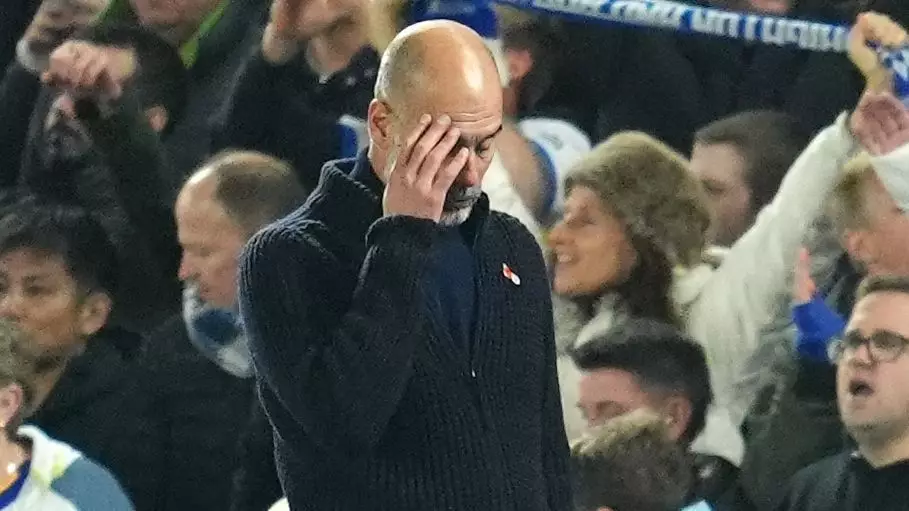In the realm of football, success is often measured by wins, trophies, and statistical dominance. However, even the most illustrious careers experience downturns, and for Pep Guardiola, the revered manager of Manchester City, the current scenario paints a surprisingly grim picture. Following their recent 2-1 defeat to Brighton, City has now faltered in four consecutive matches—an unprecedented statistical low for Guardiola since he took the reins of a team known for its attacking prowess and tactical sophistication. This surprising turn of events has raised questions not only about the team’s trajectory but also about Guardiola’s tenure and the vulnerabilities that have surfaced during this challenging phase.
Historic Context of Guardiola’s Tenure
Lauded as one of the premier coaches of the modern era, Guardiola’s managerial journey began in 2007 with Barcelona, where he rapidly established himself as a tactical innovator. However, the keenest observer of his career would note that even during his time at Bayern Munich and Manchester City, he seldom faced an adversary as formidable as his current context. The last time City experienced four consecutive losses dates back to 2006, a time before the club’s transformation propelled by the Abu Dhabi takeover. This period is marked not only by a shift in ownership but by the elevation of City into elite European status.
The implications of four consecutive defeats take on added significance when one considers Guardiola’s track record. In the 2014-15 season, despite a tumultuous stretch of losses, the context was markedly different; Bayern had already secured the Bundesliga title. Today, however, City sits five points shy of league leaders Liverpool, fiercely competing not only for domestic honors but European glory as well. This sudden shift raises eyebrows and questions about the sustainability of Guardiola’s strategies in a landscape that has increasingly become competitive.
In assessing the current struggles of Manchester City, one cannot ignore the crippling injury list that threatens the backbone of the squad. Guardiola’s pressing style and tactical audacity hinge significantly on the physical capabilities of his players, and with the absence of key figures like Rodri, the reigning Ballon d’Or winner, and a host of first-choice defenders, the strain on the remaining personnel has become insurmountable. This depletion runs parallel with a congested fixture schedule that leaves little room for recovery or tactical adjustments.
The manager himself has openly voiced concerns regarding the implications of severity in injuries. “We cannot do it every three days,” Guardiola stated, underscoring a growing sense of urgency. Meanwhile, as captain Kyle Walker articulated post-game, the onus now lies on the players to rally together and restore the club’s pride. Yet the question remains—can they withstand the pressure in the absence of key performers, and is the squad deep enough to contend with such demanding circumstances?
Despite the overarching challenges, one might argue that the tactical adaptability of Guardiola will eventually light the path to revitalization. Historical data suggests that Guardiola’s ability to maneuver and adapt his strategies often plays a pivotal role in navigating crises. Yet, he faces an uphill battle; the initial dominance City demonstrated against Brighton before capitulating in the second half can be perceived as indicative of a broader systemic issue.
Arguably, Guardiola’s tactics require meticulous execution, demanding physical and mental sharpness from each player within his beautifully regimented system. The inconsistency we’ve seen—strong first halves followed by uninspired second halves—hints at a psychological barrier that transcends mere tactical adjustments.
As Manchester City navigates through this tumultuous stretch, the season is far from over. History shows purple patches can quickly transform, sometimes in the blink of an eye. While Guardiola’s legacy, built upon a foundation of success, hangs in a precarious balance, it is essential to remember that resilience is often born from adversity.
Whether this spell heralds the end of an era or simply a phase requiring renewal is yet to be determined. For now, the merging of players’ determination, strategic innovation, and perhaps a touch of good fortune with injuries will dictate whether Manchester City can reclaim their mantle atop English football. The journey to recovery is daunting, but if history is any guide, there are still moments of brilliance waiting to shine through the clouds of disappointment.

